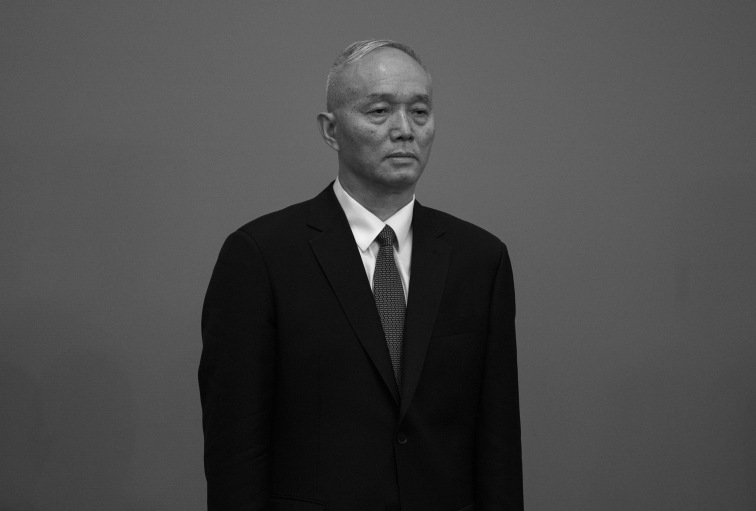Officials of Chinese Communist Party (CCP) were having a meeting. (Photo by Lintao Zhang/Getty Images)
[People News] On September 19, U.S. President Donald Trump held a phone call lasting more than two hours with Chinese Communist Party (CCP) leader Xi Jinping. The two confirmed they would meet at the upcoming Asia-Pacific Economic Cooperation (APEC) summit in South Korea, and planned for Trump to visit Beijing early next year, with Xi expected to make a return visit to the U.S. at an appropriate time.
On September 21, a bipartisan delegation from the U.S. House of Representatives, led by Democratic Congressman Adam Smith, visited Beijing and met with Premier Li Qiang. Not long ago, U.S.–China trade talks concluded in Spain. On the highly watched issue of TikTok’s sale, the CCP has sought to trade concessions in other areas in exchange for holding firm on TikTok’s core technology. Public opinion widely sees these moves as Beijing’s efforts to pave the way for Trump’s visit.
The Wall Street Journal reported that Chinese diplomats have been actively lobbying for Trump’s visit over the past two months. Analysts believe that with the CCP’s Fourth Plenary Session approaching, Xi Jinping is facing a power crisis but does not want to step down. Securing Trump’s visit, he believes, could serve as an endorsement and bolster his grip on power.
According to an informed source, as a condition for Trump’s visit, the U.S. government has made clear demands: China must make concrete concessions on trade, TikTok, and other issues, delivering tangible “deliverables.”
The day before the Trump–Xi call, on Thursday the 18th, Trump told reporters at a joint press conference with U.K. Prime Minister Keir Starmer, “On Friday we’ll be talking with Xi Jinping, to see if we can reach a final agreement on TikTok.” After the September 19 call, Trump described it on social media as a “very productive conversation.”
For Beijing negotiators, TikTok is not just an entertainment platform but a strategic tool capable of subtly shaping public perception and decision-making. It can influence U.S. public opinion, even elections, without leaving a trace. However, according to Reuters, although Beijing reluctantly agreed that TikTok in the North American market could become U.S.-owned, the CCP attached conditions—such as a U.S. commitment not to restart trade escalation.
The CCP’s Foreign Ministry announced that Li Qiang will attend the 80th session of the U.N. General Assembly in New York from September 22–26. Analysts suggest Li may also meet with senior U.S. officials to push forward Twith rump’s visit. It is expected that Li will signal that if Trump visits this year, Xi will remain open to attending the 2026 G20 summit in the U.S.
Yet in its report on the Trump–Xi call, the Foreign Ministry website downplayed the topics of Trump’s Beijing visit and Xi’s participation in the G20. On TikTok, it only stated briefly that “our position is clear.” Instead, the statement emphasised Trump’s comments that the September 3rd military parade was “wonderful” and highlighted that the U.S. and China were allies in World War II: “The Chinese people will not forget the valuable support from the U.S. and other anti-fascist allies during China’s resistance against Japan.”
Commentators argue this is another way the CCP tries to flatter the U.S. In reality, the CCP has no right to claim America as its ally in World War II or to credit the U.S. for supporting “China’s resistance,” since it was the Republic of China and the Chinese people, not the CCP—who actually took advantage of Japan’s invasion to expand its own power—that fought alongside America. Likewise, Trump was not reminding Beijing of America’s sacrifices in China’s wartime struggle, because the Republic of China was the principal force in the resistance.
Much of what the CCP says is aimed at pleasing the U.S. Political commentator Chen Pokong, based in the U.S., noted on social media that the focus of negotiations revealed Xi’s mindset:
“Now the CCP is making countless demands of the U.S., all targeting the Fourth Plenum, because it is scheduled for late October,” Chen said. “The talks in Spain may have looked like trade negotiations, but Xi’s real goal was to secure Trump’s visit to Zhongnanhai.”
“The reason is that successive CCP leaders have relied on recognition by the U.S. government as a form of political endorsement to show strength within the Party. From Jiang Zemin and Hu Jintao to Xi Jinping, this has always been a deep-seated concern,” Chen explained.
According to Chen, Xi is desperate for Trump to visit China because it would serve multiple purposes. First, by hosting Trump in Beijing, Xi could create the impression for the Chinese people that the U.S. president is seeking him out. Second, it would reinforce his strongman image and intimidate rivals within the Party. Third, it would showcase internationally that Xi not only stands shoulder-to-shoulder with the U.S. but can even compel the American president to come to Beijing and seek him out.
“In fact, what Xi is doing reflects his power crisis,” Chen concluded.











News magazine bootstrap themes!
I like this themes, fast loading and look profesional
Thank you Carlos!
You're welcome!
Please support me with give positive rating!
Yes Sure!